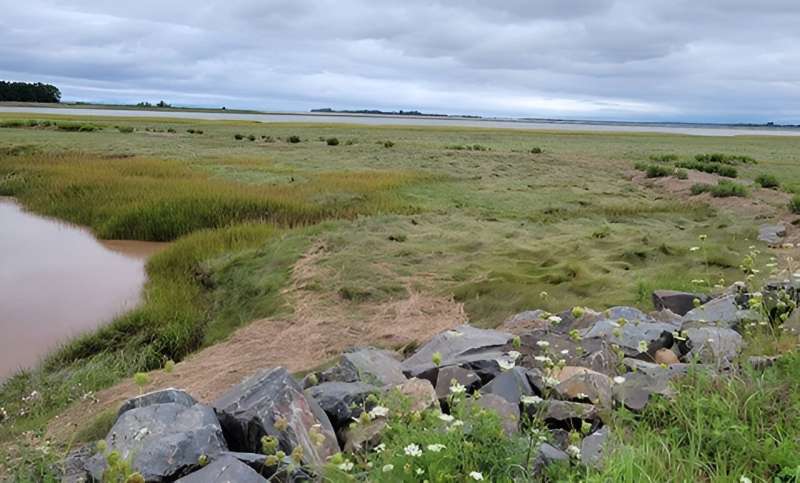This article has been reviewed according to Science X's editorial process and policies. Editors have highlighted the following attributes while ensuring the content's credibility:
fact-checked
trusted source
proofread
Expert report imagines possible futures for ecologically rich slice of Nova Scotia

The tidal wetlands and dykelands of the inner Bay of Fundy are recognized as critical ecosystems in Nova Scotia and New Brunswick, as they provide essential benefits to both human and non-human communities.
These ecosystems are habitats for biodiversity; protect, businesses and residences from coastal flooding; and, have cultural values for Indigenous communities and Acadian heritage among many others. However, they are increasingly threatened by the impacts of climate change, making their management more complex and uncertain in the future.
A new report by NSERC ResNet, a Canadian project that studies ways to better manage these ecosystems for sustainability and resilience, explored how the tidal wetland-dykeland ecosystems could unfold by 2072.
The report is a synthesis of a visioning workshop that was held from Nov. 1 to 2 by NSERC ResNet, Dalhousie University, Saint Mary's University and McGill University. The workshop brought together 18 key decision-makers in research, government and civil societies in Nova Scotia who are doing projects on these ecosystems.
The report provides four "storylines" or alternate environmental futures for these ecosystems in a 50-year timeline if reactive or proactive climate actions are taken, while also looking at what kind of values are prioritized in decision-making. These storylines explored not only the future ecological implications, but also tightly linked social, cultural and policy aspects:
- Eternal Optimists: A future where long-term benefits are ensured for all interest groups and future generations in the ecosystems through cross-organizational collaborations for nature-based solutions to adapt to climate change
- Dykelands of Bay Street: A future where entrepreneurs and the private sector drive credit-based innovations and financial mechanisms, such as carbon credits, for nature-based solutions to adapt to climate change
- No One Left Behind but the Kids: A future where equitable access tobenefits from the ecosystems for all interest groups becomes the policy priority, but is only sustainable for the short term due to lack of collaboration for climate change adaptation
- At least the Fish are Happy: A future where corporate or large-industry interests and demands of the benefits from the ecosystems drive how the ecosystems are used, causing eventual declines of the ecosystems' ecological conditions and plausibly abandonment of lands along the Bay of Fundy
A list of all research outputs by the group can be found on NSERC ResNet's website.
Through the report and these studies, Dalhousie University's researchers hope to contribute knowledge and develop lasting partnerships for a more sustainable and resilient future of the tidal wetlands and dykelands of the Bay of Fundy.
More information: Envisioning environmental futures for the tidal wetlands and dykelands of the Bay of Fundy. Workshop report. NSERC ResNet. escholarship.mcgill.ca/concern … /n009w7676?locale=en
Provided by Dalhousie University





















